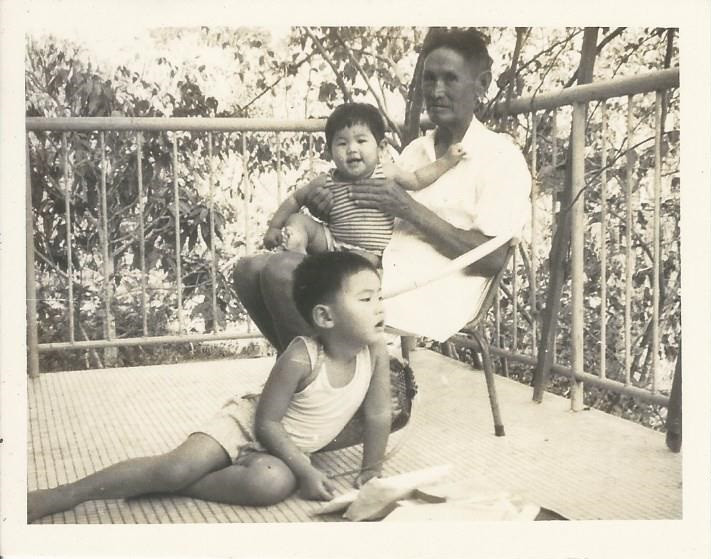How my grandfather wooed his son-in-law—with peanut cake
by Mildred Voon11 Jun 2021
It’s not every day that your future father-in-law goes out of his way to make your favourite cake for you. Except, for Mildred’s father, it was.
In January 1979 my parents, who were dating at the time, celebrated Chinese New Year in my mother’s hometown in Sibu. My father was a Hakka boy who grew up in his parents’ busy shophouse in Kuching—this would have been his first experience of a Foochow Chinese New Year in a village. This momentous trip was also my father’s introduction to his future in-laws—my grandparents and my mother’s six siblings.
My late grandfather was well-respected in the community for his work ethic as an honest real estate broker. He also had a reputation for being an excellent cook, mastering and preserving the traditions of many Foochow dishes. Back then, the word on the street was that he made the best manjiu gor (Foochow Manchurian peanut cake) in town.
In my mother’s family, manjiu gor is a must-have Chinese New Year snack, along with my grandfather’s other specialty Foochow dishes. During that fateful Chinese New Year of 1979, my father added another first to his list: his first taste of manjiu gor, made by his future father-in-law.
What is manjiu gor?
Today, manjiu gor is something of a rare delicacy. Historically, the cake was made for the Qing emperor in the Manchurian Imperial palace. Foochows from my mother’s generation would remember waiting patiently for their parents to return from town after attending grand weddings, bringing home packets of manjiu gor. In present times, only a few families still make manjiu gor during Chinese New Year. It is no longer served at Foochow wedding banquets, nor found in traditional Foochow snack shops.
Manjiu gor is a dense, steamed cake, sweet and mildly savoury at the same time. It is made of a vigorous mixture of flour, freshly roasted peanuts, crispy deep-fried shallots, bits of sweet jujube dates, sugar, fat (traditionally a mix of pork lard and vegetable oil), a dash of salt and a healthy sprinkling of toasted sesame seeds.
First timers would find manjiu gor extremely interesting, perhaps like nothing else they have ever eaten before. In essence, manjiu gor is a cake with multiple personalities. It has the texture of a brownie, with delightful surprises. In the same bite, you get the nutty crunch of peanuts and soft tender morsels of sweet dates, amidst a creamy luxurious cookie batter.
The secret to good manjiu gor is patience. You need this patience to peel, slowly slice and carefully deep fry shallots to the exact level of crispiness. It is bizarre to even imagine putting onions in cake, but in the case of manjiu gor, shallots are the key ingredient that elevates the cake. The unlikely ingredient adds a fragrant and deep, caramelised flavour profile to the cake.
My grandfather’s manjiu gor tactics
To my grandfather’s delight, my father loved manjiu gor. It was the perfect combination of sweet cake and peanuts—both things that he loves. Apparently, my father ate so many pieces, and my grandfather kept putting filled plates of cake in front of him. The story goes that my grandfather really liked my father, and was determined to secure him as his son-in-law, using his secret weapon of manjiu gor.
My grandfather made it a point to prepare freshly steamed batches of manjiu gor every time my father visited. Soon, my grandmother, uncles and aunties would call manjiu gor my father’s ‘opium’, as he seemed addicted to the cake. My father was definitely pampered by my grandfather—not only was he presented with fresh manjiu gor as soon as he arrived in Sibu, but upon leaving, would also be gifted with containers of cake to go.
Surely enough, my grandfather’s efforts bore fruit. My parents got married in Sibu several months later, in a simple church wedding ceremony. And even after my father no longer needed to be lured into the family with the bait of manjiu gor, even after both my grandparents passed away, my aunts continue to make manjiu gor for my father—to this very day.
Try Mildred’s aunt’s manjiu gor recipe here.
**
Mildred Voon is on a quest to master traditional Foochow and local Sarawakian recipes from her shared family kitchen in Kuching.
Read next
A father’s legacy in soy sauce
A tale of family, grief, and kicap

Amid a pandemic, yee sang all-year-round
Honey, toss that yee sang

Of Prosperity Burgers and my long-distance friend
There's something about Marsha






